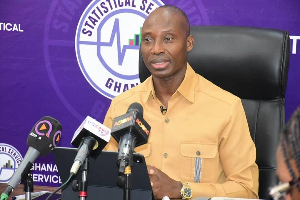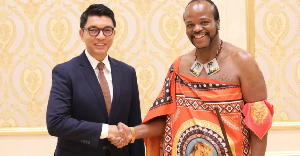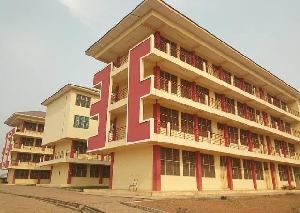To see how Ghanaians are increasingly comprehending their nation-state, look no further than what Women and Children Affairs Minister, Hajia Alima Mahama, told the Parliament of Ghana that about 100 Community Child Protection have been set up to ensure that laws relating to culturally-influenced “forced or early marriages and other offences against children are checked” and Mr. Prince Kofi Amoabeng, Chief Executive Officer of Unique Trust Financial Services, observation that Ghana would not be able to achieve the needed developmental growth if it “continued to bend the rules to suit people in high offices” due to certain aspects of the Ghanaian culture and that “some aspects of our culture make us timid. ”
The misunderstanding not only complicates Ghana’s progress but has driven on since 1957 when the Ghana nation-state was formed, because, as A.L Adu explains in “The Administrator and Change,” European neo-liberal values/paradigms, though is the dominant development driver in Ghana, “have not been strong enough to create lasting institutional and attitudinal basis for political development.” The result is not only rifts of values within the development process but the blinding of Ghanaians, especially its sleepy elites, from comprehending the nation-state as deeply and rigorously as possible in regard to the two contending values – traditional Ghanaian values and Western neo-liberal ones - wheeling Ghana. In the global development context, Ghanaian elites look awkward in appropriating their traditional values for progress as the Southeast Asians have done. Steadily, as Ghanaians attempt to understand Ghana, Oyokoba, a contributor to www.ghanaweb.com, has suggested that out of the many Ghanaian traditions, Ghanaians should “come up with integrated traditional customary practices that, at the minimum, serve our peoples interests across the board, no matter where one finds himself.”
For historical and intellectual reasons, the Ghana nation-state has not been comprehended from within its traditional values but the ex-colonial ones. Despite the trouble of taking almost 50 years before attempting to know and understand Ghana, Ghanaian elites – timid and rudderless – are showing deeper and broader grasp of Ghana as a development project from within Ghana’s foundational values. It is a departure not only from years of high proclamations and emptiness but actual practices as Alima demonstrates. Part of the reason for this state of affairs has been that Ghana was created not by the 56 ethnic groups that form Ghana but by the fiat of the British colonialist from their development values/paradigms or more appropriately, to use a Biblical term, from their “image.” Despite the colonialist policy of indirect rule, driven by centralized despotism, that used traditional rulers as proxies in a dictatorial fashion, Ghana was seen from purely British development values/paradigms perspectives.
Such mismatched practices in the Ghanaian environment have for long created developmental complications – with the average Ghanaian wrongly feeling that European values are superior to theirs. This has made the grappling of Ghana harder in regard to developmental challenges, in an atmosphere where Ghanaians values are twisted in its own domain and made to appear “backward” and not fit for progress. Ghanaian elites, too, have been finding it difficult to reclaim and secure their nation-state from within their innate cultural base. The informal economic sectors, which form over 70 percent of the Ghanaian economy, for instance, are not strategically considered when national development planning is being undertaken. The elites’ weak grasp of Ghana is seen in a financial and banking sector that does not reflect strategically the Ghanaian environment. Ghana’s informal economy is yet to see a Dr. Muhammad Yunnis, the Bangladesh banker and Nobel Prize winning economist, successful application of the concept of traditional micro-credit (which can variously be called “Osusu” in Ghana), so as to open the hugely untapped wealth in this area for progress. The genius of the Yunnis microcredit concept is the ability to bring the informal economic sector into the formal economic sector part of which involved extending “small loans to entrepreneurs too poor to qualify for traditional bank loans and done so without collateral.”
Both Alima and Amoabeng view reflect some of the chronic cultural inhibitions stifling Ghana’s progress. While today attempts are being made to empower women to free them from excessive patriarchy and other practices that undermine their progress, it is not enough. In most parts of Ghana child-girls are still forced either to be betrothed or the subject of dowry transaction, or to be forcibly married. Thus cutting them off to get education and contribute meaningfully to national development. Added to Alima’s is Amoabeng’s insightful observation of the issue of the “Big Man” syndrome, more appropriately the projection of dominant “Elders” or the “Aged” or patriarchy over both gender in the development process against all progressive rules and practices, most of which have resulted in developmental retardation. Not only are rules twisted to suit tribes, ethnic groups, Old School boys and girls, and Big Men or Big Women but people in high offices, no matter their age. The result is “some aspects of our culture making us timid” and retarding Ghana’s progress.
Recent thinking, talking and debating aside, the attempts to comprehend the Ghana nation-state from within the traditional values of the 56 ethnic groups that form Ghana dates back to pre- and –post independent times, though most of these thinking did not see any strategic appropriation into policy-making, bureaucratization and consultations, as the Southeast Asians and others have done. It has been more of big talks and no substantial appropriation in national development planning.
In “Rebellion, Revolution and Tradition: Reinterpreting Coups in Ghana,” Maxwell Owusu, of University of Michigan, an anthropologist who partook in writing Ghana's constitution and participated in creating Ghana’s decentralized District Assembly architecture, reveals that either civilian governments or military juntas, Ghanaian traditional values have been on the national development radar, sometimes even used to justify the overthrow of governments such as that of the President Kwame Nkrumah government in 1966. But all these are weakened in terms of bureaucratizing them with the ex-colonial development paradigms. This indicates that there are attempts to comprehend the nation-state from within traditional Ghanaian values. Significantly, and which is indicative of almost all governments of Ghana since 1957, Owusu quotes the former Provisional National Defence Council (PNDC) regime’s “The Directive Principle of State Policy” as saying, “the adaptation and development of traditional cultural values as an integral part of the growth and development of society.”
Good thought, albeit rhetorically, to revolutionally re-tool the unbalanced Ghanaian nation-state. But all of these high sounding talks of Ghanaian traditional values and its mixture in the nation-state’s progress didn’t see the traditional values worked deeply enough with the ex-colonial neo-liberal values in the development process, as the Southeast Asians and others have done. Owusu’s brilliant re-interpretation of Ghana’s popular movements from its foundational traditional values perspective demonstrates that there are already the comprehensible foundational traditional values and expertises, as Owusu himself exemplify. Despite the multi-ethnic make up of Ghana, it is possible to comprehend the nation-state from within Ghanaian traditional values, and its corresponding appropriation for policy-making, bureaucratization and consultations for progress.















